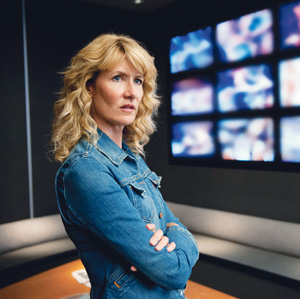

ON THE NEW HBO show Enlightened, the tightly wound Amy Jellicoe, played by Laura Dern, tries so hard to stay positive. For her own good, she must stop. After a workplace meltdown, which culminates in Amy prying open an elevator door to shriek at her boss and onetime lover, she plateaus.
Escaping to a Hawaiian retreat, her sensitivity is acute—finding purification in the warm glow of a bonfire or seeking the divine in a sea turtle—though still short on basic self-awareness. She’s on a journey; who knows where. But better yet: Who is she? A wrongfully maligned saint or a dangerous egomaniac?
Enlightened, which began its second season on Jan. 13, does more than loop tiresome melodrama with canned aphorisms. The show is about narcissists doubling down on self-preservation as they cope with reality, and how they reduce those around them to mere props, demanding the kind of compassion they can’t give in return. Amy dives into the task of feeling good, of wanting to be good—conflating “intention” with an affirmation of her ideal self—but she isn’t prepared to do the heavy lifting.
In denial, she goes back to California reborn, thinking all has been forgiven. It has not. Amy’s employer, Abaddonn Industries (Hebrew for “place of destruction”), shows her a recreational contempt. Krista (Sarah Burns), her old assistant, now has her old job and office. Nobody, least of all disgraced manager Damon (Chip Esten), wants anything to do with her.
Threatening to sue, Amy hectors Abaddonn into offering her a job: data entry for a mysterious wing of the company located in the basement, home to other undesirables and a chauvinistic dingbat of a boss named Dougie (Timm Sharp). Sharing a desk with Amy is Tyler, played by show creator Mike White.
For White, life has a silly and disquieting premise. This is true for Enlightened as it was for the tragicomedy film Chuck and Buck, which White wrote and starred in. Dern and White are neighbors, and contributed equally to the show’s evolution. Their performances move mountains with polarizing expressiveness. Dern’s gestures are ferocious, while in White’s eyes we see a wellspring of kindness and grace. Neither hides their autobiography—emotions burn with authenticity.
Dern is perfect as the anti-heroine, a popular role with some notable company. There’s the brilliant and bipolar Carrie Mathison on Homeland. Weeds‘ Nancy Botwin is a good person whose goodness ebbs and flows, reverse-engineering the traditional success story with each episode. Still, darker heroines could just as well be generalized without respecting their different pedigrees.
For men, it’s a careful study. The antihero is enough of a cliche to merit his own sliding scale. Points on the graph include Breaking Bad‘s leading menace Walter White and the sexual pathology of Don Draper on Mad Men. Their forms of dysfunction are scary but not disdained. The transformation from high school teacher or disgraced soldier to drug kingpin or virile ad man is a victory; even if you disagree with them: they have their admirers.
With Enlightened, it’s the polar opposite. Amy isn’t heroic; although as the second season begins she is uncovering some messy facts about Abaddonn’s environmental dealings. She has not been reincarnated, either; she’s regressed. Her emotionally withholding mother (Dern’s real-life mother, Diane Ladd) is weary of her daughter’s Second Coming. To her mind, Amy’s a liability, a towering infant taking a fire hose to her mother’s tranquil routine and flooding it with white noise and desperation.
Rebuffed by everyone, Amy runs to the familiarity of ex-husband Levi (Luke Wilson), a contented drug addict who receives Amy with a hesitant embrace. She wants to save him, but doesn’t understand that he doesn’t want her to. In denying her, he stops her from self-identifying as a good person. Now who will she be?
Based on the show’s low ratings, few seem to be interested in that answer. And that’s a pity, because Amy is also a complicated, empowering presence. She’s not coming of age on Girls, which airs right before Enlightened and is beloved by audiences and critics alike.
Speaking to The New York Times, Dern saw an ominous parallel: finding yourself in your 20s is fun, but do the same in your 40s and you’ll become a “cautionary tale of who not to be.” At Amy’s age, she’s supposed to have settled in. Instead the tide has washed her footprints from the sand. She isn’t in need of the same things anymore—Where do I go from here?” she asks. That seems like a different question every day.


